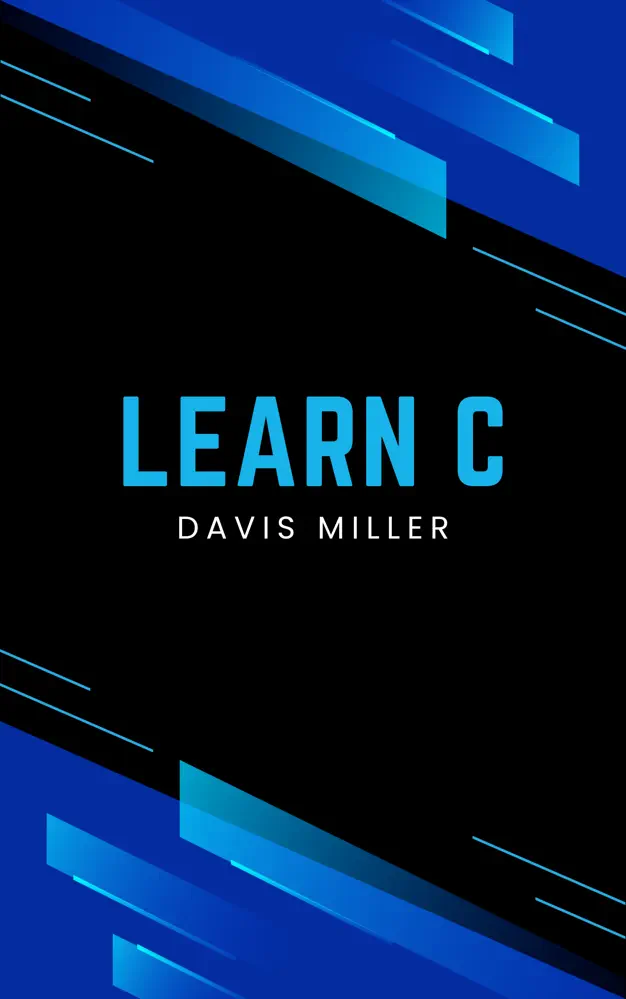davismillerbooks
Learn C

Buy the Book
You can buy the complete book with detailed explanations, code examples on:
Amazon Paperback
Kindle Edition
Amazon Hardcover
Google Play Books
Audiobook
Apple Book
Books to Read
Welcome to Learn C, a comprehensive guide crafted to introduce you to the timeless programming language that has been the backbone of modern software development for decades. Whether you’re a complete beginner embarking on your first coding journey or an experienced programmer seeking to refine your skills, this book is designed to meet you where you are and take you further than you thought possible. C is not just a language—it’s a foundation. Understanding C will unlock pathways to system programming, game development, embedded systems, and even the languages that have evolved from its powerful structure, such as C++, Java, and Python.
In this book, you’ll find a structured approach that makes learning engaging and accessible. We start with the basics—variables, data types, and loops—and progressively delve into advanced topics like memory management, pointers, and multi-file programming. Along the way, you’ll gain hands-on experience through carefully designed examples and projects that demonstrate how C applies to real-world problems. Whether your goal is to build your first application, understand how computers work at a deeper level, or prepare for a career in software engineering, Learn C will equip you with the skills and confidence you need to succeed. Let’s begin this exciting journey into the world of C programming together!
Table of Contents
Introduction to “Learn C” by Davis Miller
- Table of Contents
- Introduction to C Programming
- History and Evolution of C
- Setting Up the C Development Environment
- Writing and Running Your First C Program
- Structure of a C Program
Basics of C
- Variables, Constants, and Data Types
- Operators in C
- Type Conversion and Type Casting
Control Flow
- Decision-Making (if, if-else, switch-case)
- if Statement
- if-else Statement
- if-else if-else Ladder
- switch-case Statement
- Summary of Decision-Making Constructs in C
- Loops in C
- Break and Continue Statements
- The goto Statement
Functions
- Function Declaration, Definition, and Calling
- Pass by Value and Pass by Reference
- Scope and Lifetime of Variables
- Recursion
- Inline Functions and Function Pointers
- Inline Functions
- Function Pointers
- Key Differences
- Advantages and Disadvantages
Arrays and Strings
- One-Dimensional and Multi-Dimensional Arrays
- Array Initialization and Manipulation
- Strings and String Manipulation
- Array of Strings
- Common Pitfalls with Arrays and Strings
Pointers
- Basics of Pointers
- Pointer Arithmetic
- Pointers and Arrays
- Pointers and Strings
- Double Pointers
- Pointers to Functions
Structures and Unions
- Defining and Using Structures
- Arrays of Structures
- Pointers to Structures
- Self-Referential Structures
- Unions
- Differences Between Structures and Unions
Dynamic Memory Management
- Introduction to Memory Management
- Common Memory Management Errors
- Best Practices for Memory Management
File Handling
- File Operations
- Error Handling in File Operations
- Binary File Handling
- Random Access in Files
Advanced Topics
- Command-Line Arguments
- Preprocessors and Macros
- Enumerations and Typedefs
- Enumerations (enum)
- Typedefs (typedef)
- Combining Enumerations and Typedef
- Differences Between Enum and Typedef
- Summary
- Bit Manipulation
- Working with Time and Date
- Variable Argument Functions (stdarg.h)
Data Structures in C
- Linked Lists
- Stacks and Queues
- Trees and Binary Trees
- Hashing and Hash Tables
- Sorting and Searching Algorithms
Error Handling
- Common Runtime Errors
- Debugging Techniques
- Assert Statements
- Best Practices for Writing Robust C Programs
Working with Libraries
- Standard Library Functions
- Math Library
- String and Character Handling Functions
- Creating and Using Custom Libraries
Interfacing with Hardware
- Low-Level Programming
- Interfacing with Peripherals
- Basics of Embedded Systems
- C for System Programming
Portability and Optimization
- Writing Portable C Code
- Understanding and Improving Performance
- Compiler Optimizations and Flags
- Profiling and Benchmarking
Case Studies and Real-World Applications
- Developing a Simple Game in C
- Building a Text-Based File Manager
- Parsing and Processing Data Files
Appendix
- ASCII Table
- Commonly Used Libraries and Tools
- FAQs and Troubleshooting Tips